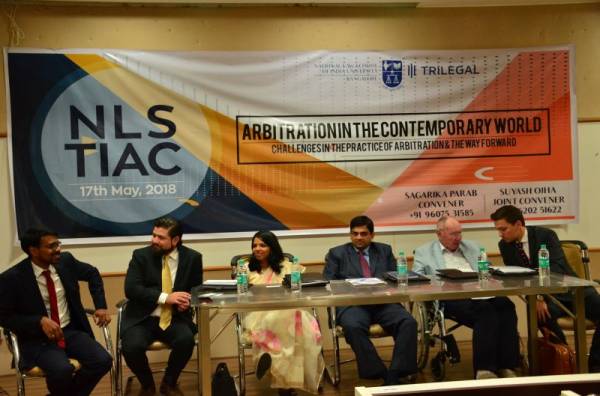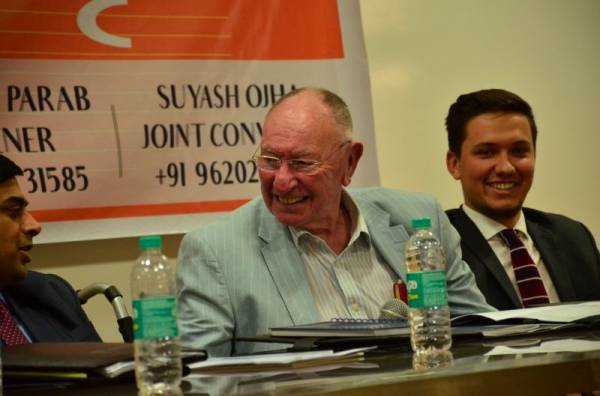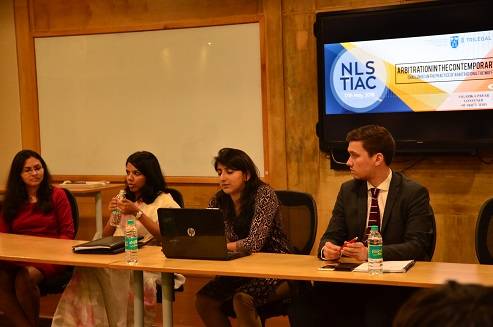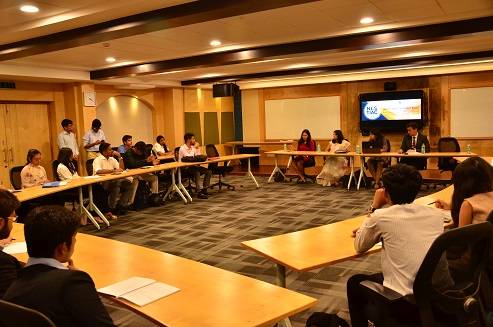Experts & Views
Today marks the first edition of the NLS- Trilegal Arbitration Conference, organised by the Moot Court Society of the National Law School of India University, Bangalore, in collaboration with the Alliance of Oversensitive Women (Aow)- The NLS Feminist Alliance.
The conference is divided into two sessions, with the first session on Time and Cost Saving in Arbitration, commencing at 11:30 AM on May 17, 2018.
Session One: Time And Cost Saving in Arbitration
Prof. Martin Hunter began his keynote address on a jovial note and also mentioned how many times he had changed his plans about the way in which he would direct this conference.
His main focus seems to be on the fact that lawyers today have become extremely expensive to hire and he also addresses the difference between maintenance and champerty.
With this he introduces the concept of third party funding which would allow impecunious people to find a way to enforce their rights.

The discussion soon turns immensely interactive and interesting. The panel addresses the fact that legal costs provided by Indian Courts are hugely disproportionate . Champerty may be considered immoral and opposed to public policy or that perhaps the provisions under tort law or Advocates act may render it illegal.
The public policy question is addressed at length and the audience also gets involved. A few major questions raised are whether third party funding would be against public policy if it encouraged corruption , and whether the status of legal aid provisions under the Indian constitution was akin to third party funding.
Almost all panelists agree that there is a need to regulate this process but how this regulation would take place is still not known. Mr.Hunter states that there needs to be 'a soft touch' in this kind of regulation
At this point Joint convenor Suyash acknowledges the erudite opinions displayed and directs the floor towards the question at hand: Is arbitration really time and cost effective?
The panelists talked about the role of India's population in slowing down the judicial proceedings. In response to a sarcastic comment about the super fast functioning of Indian courts, a panelist replies: Why do Indian litigations take so long? Because they keep in line with our belief in reincarnation.
The next theme discussed was with respect to what leads to delays in arbitration:
1. whether challenges to arbitration awards contribute to delayed proceedings of arbitrations.
2. Manner in which arbitration is conducted is like courts( Litigation Hangover)- Dates are selected, documents are marked.
3. In Indian courts only retired judges are arbitrators- This may lead to an icreased tendency to use evidence even when it is not as relevant in arbitration.
Towards the end of this session, Mr. Martin Hunter summarises the conclusions and ends with his own experiences in the arbitration in the case of Oscar Pistorius at CASS and what he has learnt about time and cost effectiveness in arbitration from that case.
Session 2: Equality in the Arbitration Community
The Moot Court Society and the NLS Feminist Alliance have come together to organize this session with a stellar panel - Anuradha Agnihotri, Kshama Loya, Simon Weber and the moderator Ms. Shraddha Chaudhary.
The panel asks the audience what they are looking for out of this discussion, and they have received some interesting observations. Gender inequality is a problem everywhere so what makes Arbitration so different? To that, the panel feels that firstly, even though parties can choose their own Arbitrators, there is an implicit gender bias. Secondly, women need to balance between family and work more than men. Thus, more flexible arrangements are required to counter this.
Mr. Simon agrees and calls Arbitration an "Old Men Club". However, he feels the younger generation has seen a rising number of women participating, and he substantiates it by giving personal examples. However, certain expectations need to be changed. Both parents should have equal responsibilities. Its a parent problem, rather than a society or mother problem.
Gender equality is a gender neutral issue.
If there are an equal number of men and women on a panel, there will be diverse views on the issue. So there will be a difference in the result itself. So what are some of the strategies that can be employed to ensure this and who should be responsible for the same?
Ms. Loya feels that the Arbitral Institutes can play a role in providing an opportunity and encourage women to get these experiences. Moreover, women, specifically Indian women, need to build their visibility and networking. Once the visibility and technicalities are there, then women can win the battle.
Mr. Simon feels that the International Bar Association should include guidelines to allow diversity on the panels. The panel feels that it is too soon to comment on the Equal Representation in Arbitration Pledge which was launched in 2016, but it is a good sign that statistics are coming up. On a positive note, in the last decade, there is not a lot of overt discrimination. To this, a participant points out that some Arab nations do not enforce Arbitral Awards that are given by a female Arbitrator. The panel feels the only solution is to freeze the assets of the losing party elsewhere.
The government can ensure that women are present on the panels for the conferences held by them, along with including them in awareness drives. Moreover, reservation is not a temporary solution. It only takes away from the merit. What can be done is to have a blind appointment system - where only CVs are used to choose arbitrators.
Reservation is not a permanent solution, change in inherent attitude is.
With that, we come to an end of the first NLS- Trilegal Arbitration Conference. The panel leaves us with interesting concluding remarks: The more you gain inspiration and connect with people around you, the more you are encouraged to do the same. Self motivation is the key.



threads most popular
thread most upvoted
comment newest
first oldest
first
Redfern- Hunter padhi bhi hai kabhi?
threads most popular
thread most upvoted
comment newest
first oldest
first